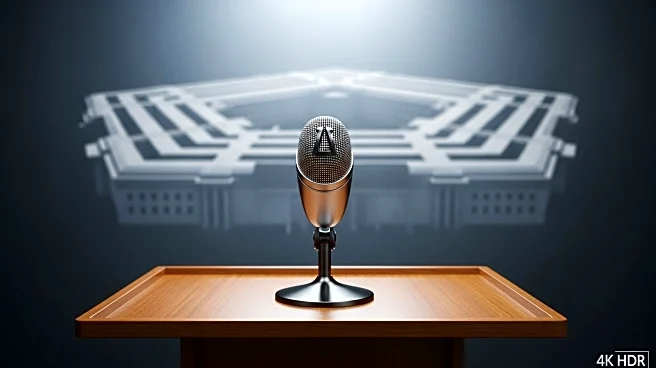What is the story about?
What's Happening?
The Pentagon has introduced new rules that limit media access within its premises, requiring journalists to sign a letter acknowledging these restrictions to retain their access badges. The policy mandates that Defense Department information must be approved for public release by an authorized official, even if unclassified, with stricter controls on classified material. This move has alarmed journalists and press advocates, who view it as a threat to the constitutional protections of a free press. Defense Secretary Pete Hegseth's team argues the changes are necessary for national security, while journalists see it as an attempt to control the narrative and avoid negative coverage. The policy has led to confusion and concern among news organizations about the implications of signing the acknowledgment letter.
Why It's Important?
The new Pentagon policy has significant implications for press freedom and transparency in the U.S. It challenges the media's ability to report independently on military affairs, potentially limiting public access to information about government actions. This development could affect how the public perceives military operations and the accountability of government officials. Journalists argue that the American people have a right to know how their money is spent and what actions are taken in their name. The policy may also set a precedent for other government agencies to impose similar restrictions, impacting the broader landscape of media freedom and public access to information.
What's Next?
The ongoing dispute between the Pentagon and journalists may lead to further negotiations to clarify the policy's terms. News organizations are considering their options, with some seeking legal review before deciding whether to comply. The Pentagon's approach to media access could face challenges from press freedom advocates and potentially result in legal battles. President Trump has expressed uncertainty about the policy, indicating possible intervention or changes. The situation remains fluid, with potential for adjustments based on feedback from media outlets and public pressure.
Beyond the Headlines
The Pentagon's policy raises ethical questions about the balance between national security and press freedom. It highlights the tension between government control and the media's role in holding power accountable. The policy could influence how journalists interact with government sources, potentially leading to more cautious reporting and reliance on unofficial channels. Long-term, this development may affect public trust in both the media and government institutions, as transparency and accountability are key components of democratic governance.















